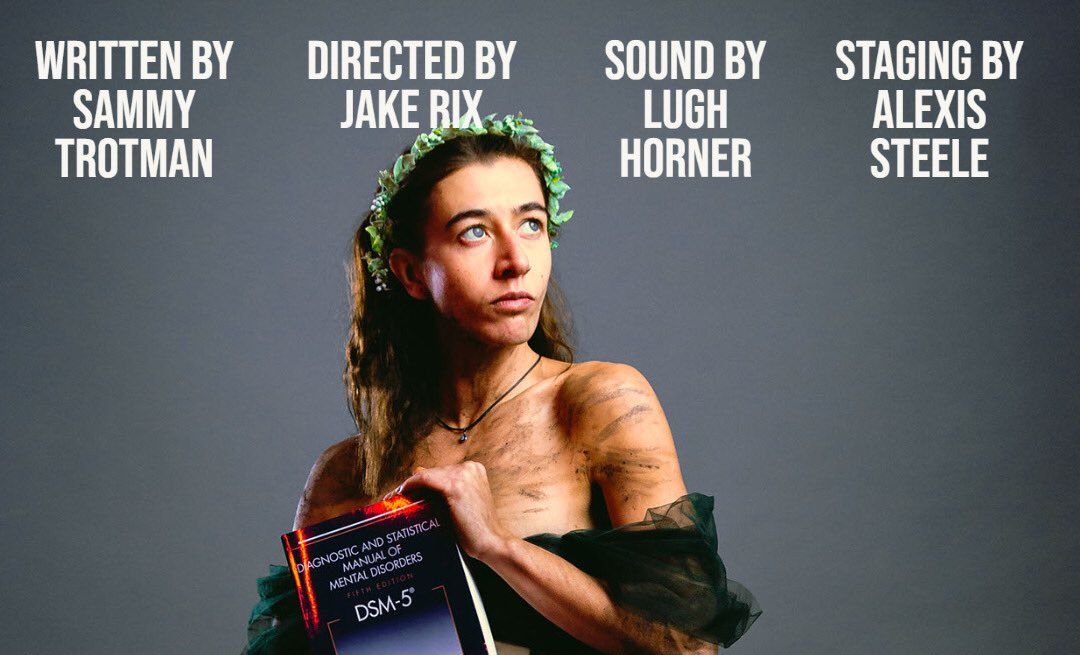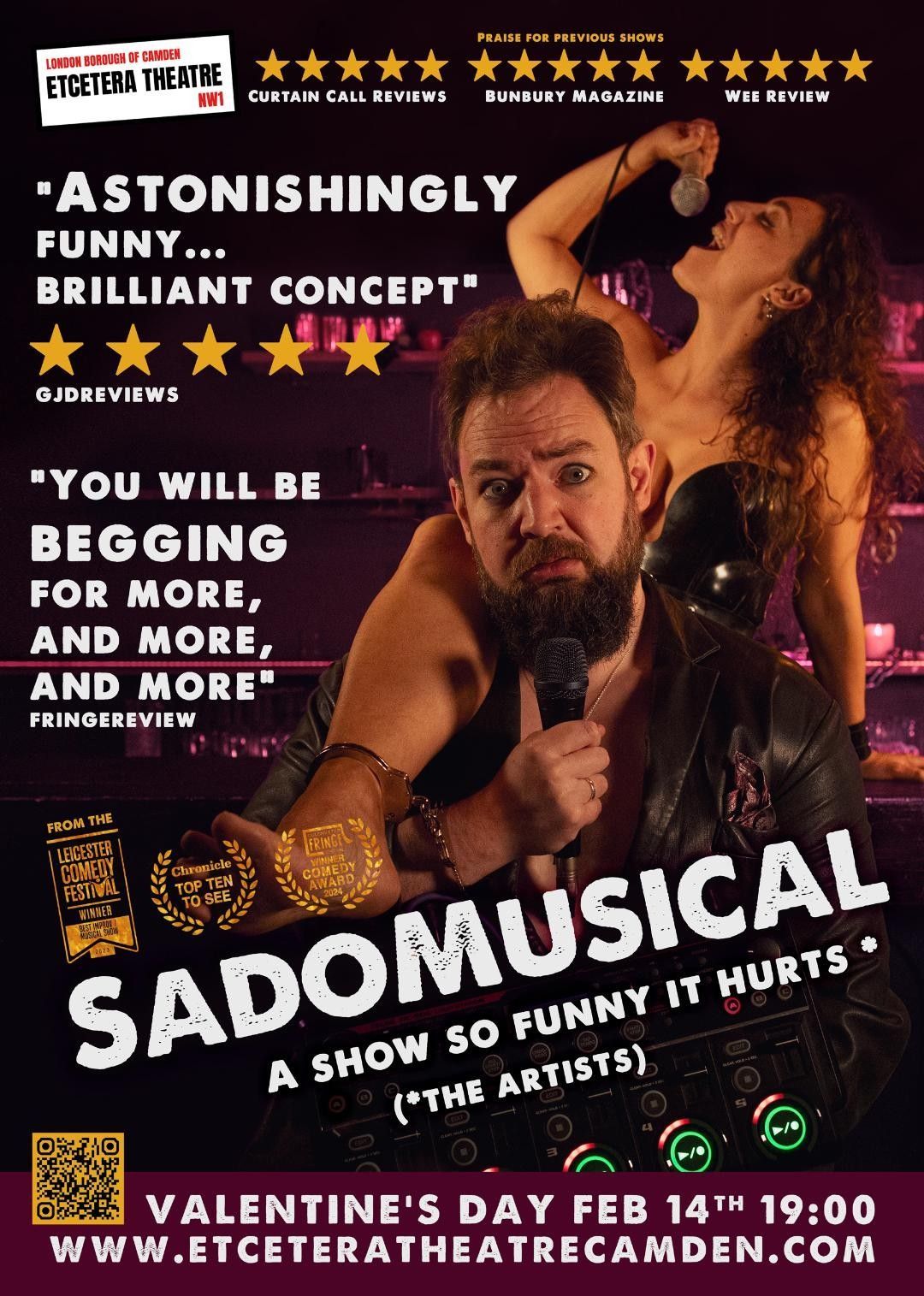That’s Not My Name is 75 minutes of anti-psychiatric satire from new writer and character comedian, Sammy Trotman. LPT magazine is fascinated to find out more about this unconventional show from ‘a featherless biped diagnosed with more mental illnesses than you have friends’ (her words, not ours!). ‘Assuming you have any friends.’
LPT: Hi Sammy, could you tell us how it all began, what was your process for the show?
It wasn’t planned, and there was no process, oddly I’m not very good at either of those things. I also explain how the show became the show, in the show, so I don’t want to give that away either.
But I started writing what, I didn’t know at the time, was to become That’s Not My Name, in a psychiatric hospital – of course, where else? (Cue my tiny violin please). I’d gone in for reasons I won’t bore you with, because those reasons and the complex mechanisms behind them are what the premise of TNMN is based on, really.
But something I don’t talk about in TNMN and was only just reminded of recently is that, just before I went into hospital, I was busy whinging to an old friend (I used to whinge a lot) who shut me up and said, ‘Go get better and use your privilege for something bigger than what it is.’
I think I was so blinded by myself at the time that I didn’t really know what he meant, but I remember thinking it sounded WEIGHTY, so I wrote it down. I found it the other day and whilst I’m not a melt, I felt like that his words were like a subconscious seed, which allowed me to recognise my vantage point in life, look outwardly and subsequently put pen to paper to write TNMN.
LPT: How much of the show is based on your own personal experience? (And could you tell us a little about those experiences).
I’m going to say 95% of the show is firmly rooted in my experience of life so far. The other 5% is hyperbole which speaks to that same truth. I cannot stand the idea of it not being real after spending such a long time unknowingly masking who I am. It makes me itchy.
And... it is only about my personal experience; I would never comment on someone else’s subjective encounter of something as complex as their mental state. I’d be being a hypocrite to the very points I make about Psychiatry if I did that!
LPT: In a sense the play is about the alure of labels, isn’t it?
Alure is a funny word. I think using the word ‘alure’ makes it feel like labels are seductive and there is active choice in subscribing to them. I don’t think we make a conscious decision to label ourselves or be labelled I just think it’s an effect of language and being human. We want to understand everything and therefore have control over it all. So, in a sense, I accept that labels can be useful tools for us, but I think when it comes to mental state and personality, I think they’re counterintuitive and quite harmful. My own experience tells me that if we are prescribed the idea of needing help, by someone who claims to be ‘expert’ in understanding your subjective experience, then helpless behaviour often ensues – especially if you are struggling with your sense of self.
I guess it goes quite heavy on deconstructing power play and Psychiatry labelling people as ‘disordered’, when Psychiatry (modern day, at least) is founded upon reintegration into a callous capitalist society that is arguably far more disordered than the people it is labelling as such.
It’s all a dichotomy of viewpoint, I guess.
Those are the serious bits, anyway. The rest is just me pratting around like the prat I am.
LPT: Having performed it at The Pen Theatre followed by a run at the Bread and Roses Theatre, what kind of response did the show receive?
The few times we’ve done it, this lovely thing happens where the emotional reaction to it is torn down the middle which sort of embodies the word ‘borderline’ – and my creative mind loves that.
The biggest one is laughter and I’m elated people are having a good time. But then, in contrast there are these eerie moments of silence, like a frost of discomfort settling, but only very fleetingly and soon be burnt away by more laughter.
The discourse around it has been split too – from an older generation, we’re hearing ‘psychotic’, ‘sociopathic’, ‘narcissistic’ – which I’m not going to argue against per se. I’ll save my musings for the show. On the flip side, most people are seeing the subtext – the complexity of behaviour, the hypocrisy of Psychiatry and the context-dependent fluidity of ‘sanity’. Two GPs who came to see it said it made them think twice about mental health screening. That really warmed my cold heart. I know it’s only a little show, doing little things, but stuff like that makes me feel like it has a small purpose.
LPT: How has working with director Jake Rix fed into the play?
Jake will underplay his role in this for sure. But I couldn’t have asked for a more intelligent and empathic friend to do this with. This is the first time either of us have done something like this and we’re totally open to the elements – which can be a bit tricky at times, but I think on the whole the naivety between the pair of us gives room for creativity and play.
Jake doesn’t believe in impossible, and he has this beautiful ability to not only see society and condition from the outer edges of it all but also put that perspective into action. Having him there to grow ideas, boundaries and the existential limits of TNMN is a necessity I didn’t know I needed when I set out, as is his openness to where each show will take us.
It changes slightly each time we do it as some of the material stales in my head quite quickly. But Jake is absolutely here for it, and at no point censoring the direction of the piece – his thought process on it is as fluid as my own and I think I needed that.
I’m very lucky to have him.
LPT: What kind of theatre appeals to you as an audience member, and has it been an inspiration to you in some way?
I enjoy experiencing theatre that questions the limits of theatre – breaking fourth walls, immersing and transporting audiences – anything that pushes boundaries: I’m here for it. I watched 20 minutes of an interactive gambling show recently at a scratch night called ‘When the Fun Stops, Start Again’ by Nathan Charles – it was relying purely on chance to even keep itself going as a show. I was tearing my hair out and sweating – wondering how the hell you can give such agency up like that. Yeah, that blew my mind, that was really clever.
I relish other people’s points of view nowadays, so I find myself going to see a lot of one person shows. I don’t tend to watch shows on in the West End, but I did see ‘Cruise’ recently and it quite forcefully put me in the shoes of someone going through (the aids epidemic) - something that I hadn’t given a seconds thought to. It’s the subjectivity of experience again. I guess I like the stuff that makes you think and feel.
LPT: If you could sum it all up in three words, what would they be? (Life, the play, anything you feel is relevant to you right now).
Please can I use five?
LPT: Finally, could you give us a taste of what to expect of your performance of THAT’S NOT MY NAME.
It’s not a sit-down-get-comfy-vino-in-hand 75 minutes, because as much as I’ve tried to stop being such a riot, turns out that sociopaths don’t (can’t) do what they’re told.
I’ll be taking no prisoners – so don’t come if you class yourself as mentally unfit.
THAT’S NOT MY NAME
Details of current tour can be found here https://linktr.ee/thatsnotmynameofficial







